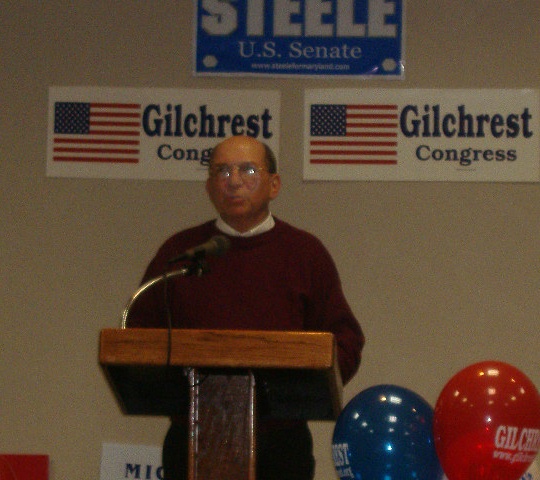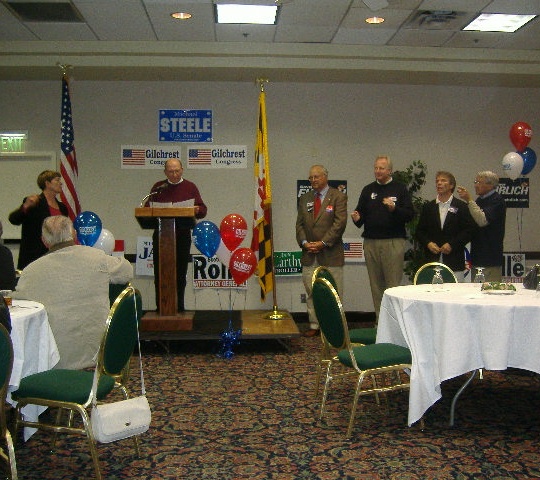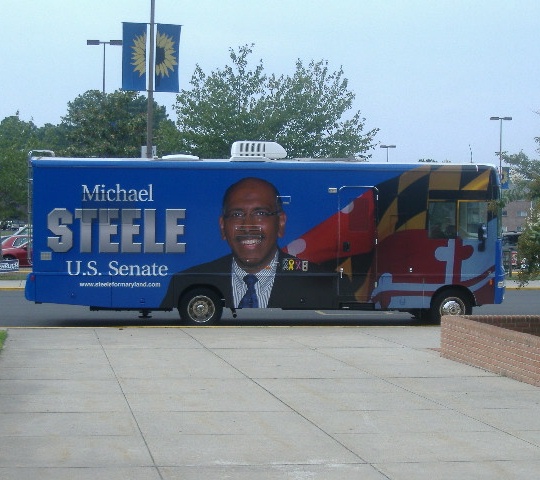Here is the final portion of my U.S. Senate “debate” that all started when I first sent out the “Ten Questions” back in early May. Four months later, it’s time for the voters to decide if any of the responders are worthy or if those who deigned not to respond still merit their vote. For my part, I wasn’t too impressed with any of the answers I got from the Republican side, but I would’ve liked to hear from the six who didn’t reply (Gordon, Shawver, and Vovak did; Bly, Hampton, Kimble, Madej, Steele, and Vaughn didn’t.) I also never got responses on the House side from any of the four candidates.
If you want to look back, part one is here and part two is here. Part one also introduces the speakers once again, plus I have the websites of those who have them linked to the right in the U.S. Senator (Maryland) category. I’ll have a much shorter list of links in a week.
This part begins with Question #7 and concludes with Question #10. On Question #10, George English is featured, when he answered the Ten Questions he deferred to his website with the exception of that particular question.
Tomorrow, I reveal my endorsements for the U.S. Senate seat from both parties.
Question #7:
Back to domestic issues. One pillar or goal of the Bush administration was to enact Social Security reform in the second term, but it has stalled because of claims there’s no problems with the program and privatization reforms are simply a way to enable Wall Street to profit. Do you think the Social Security program is fine as it is, or what changes would you advocate happening with the program?
Richard Shawver (R): Social Security reform? Social Security is voluntary for U.S. citizen, mandatory for legal aliens.
Lih Young (D): Clean up government; lack of accountability, unreliable records, accounting, bookkeeping, records, files; improper complaint processing. Prosecute, eliminate “official misconduct- government gang- fraud- crime- injustice networks” with unjust deprivation of resources (public, private) by various unlawful, unethical, immoral acts, frauds, crimes; deprived of people’s salaries, benefits (fringe benefits, insurance benefits, retirement, pension, annual/sick leaves), insurance benefits, retirement, pension, annual/sick leaves), unjust manipulation, influence: improper records, bookkeeping; improper shuffling of processing employees’ earnings, benefits, calculation of social security benefits; unjust deprivation of resources (public, private) by various unlawful, unethical, immoral acts, frauds, crimes; unjust manipulation, influence: improper records, bookkeeping; improper shuffling of processing and employees’ earnings, benefits, calculation of social security benefits; unjust denial of benefits; damage/harm supposedly workers, retirees, elderly, beneficiaries, families, socials relations, endless damages/harm (physical, mental, bodily, financial), unjust manipulation and influence: medical services, insurance plans and coverage, rehabilitation services, etc. .The problems are not just in SSA agencies, but also related agencies, e.g., Maryland State Department of Education, Barbara Smith and Susan Page, employees or phony persons, falsification, false records, refuse to provide information, files for inspection, etc.
Clean up government. Support universal national health insurance (all, Medicare, Medicaid, prescription, uninsured, catastrophic); single payer (government); simple, effective, equal, quality, meaningful, merit, accountability, preventive, affordable, low premium, cost containment (goods, services, wholesale, professional review); public funded research should benefit taxpayers not to benefit a few; public education, consumer protection. Eliminate deceit, frauds, “official misconduct- government gang- fraud- crime- injustice networks” operation, unjust practices.
Prosecute, eliminate abuse, misuse, frauds, crimes, victimize people, deprive resources, capability (public, private), fraudulent charges; unnecessary medical services, drugs, medication, equipments, surgeries, catheters, etc.
Earl Gordon (R): (I oppose) every effort by the administration to tamper with the social security system. This system is the only federal program that guarantees citizens some form of social security from complete economic destitution. There are no valid reasons to disturb the program at this time, without replacing it with a system that offers better social security guarantees to the American people, something the President’s plan does not do. If the administration wants to tackle a big issue that is of value to the American people, it should tackle the national health care issue. Ducking this issue in the light of the frequency of international travel and the international medical situations that are presented by AIDS, SARS, the Asian Bird Flu, and international terrorists using chemical and biological weapons, is tantamount to ducking a vital national security issue.
Mike Schaefer (D): This is the 3rd rail of politics and we can expect little from leadership of either party on this issue. I favor more liberal IRA programs, but so many people do not understans self-saving programs or have the money to fund them annually, and we must help those least able to help themselves. I think the program is working well but would increase the investigation of abuse, there are many dead-recipients whose families continue to cash benefits without any criminal consequences, possibly a payback and that’s it; and I now personally of recipients who cash their check, report it stolen promptly, get a new check issued, and months-later the US cancels the first check and charges it back the innocent business entity having taken it—this is long after the crook has disappeared, thus there is no recourse for the trusting businessperson. The government knows who the crooks are but public policy makes them untouchables. That is wrong, they belong in jail.
Daniel “Wig Man” Vovak (R): I believe social security should only be for retired people, not for health care purposes. There must be firm, age-based eligibility requirements and they should be consistent. Before there is any financial change to the current social security system, the private amount that each person has invested into it over a lifetime must be easily accessed through the internet and through a local office.
David Dickerson (D): As U.S. Senator, I would propose that everyone has the right to maximize their contributions to an IRA. The present retirees or the citizens approaching retirement have no problem, but they do have the responsibility to sustain the system for their children and grandchildren. Current projections show that Social Security faces a long-term financial imbalance. The Trust Fund is projected to be exhausted in 2041 (according to the Social Security Trustees) or in 2052 (according to the Congressional Budget Office), after which Social Security will be able to pay only about 75 percent of promised benefits. Hence, reforms to restore long-term Social Security solvency are essential. If no changes are made, revenue transfers totaling $4 trillion, in today’s present-value dollars, would be needed to pay currently scheduled benefits over the next 75 years. The amount needed to assure permanent solvency over the infinite horizon is $11 trillion. Many of our government employees have better health and retirement plans than the normal Marylander worker, and I believe that there should be the same rights of Social Security Planning afforded to everyone!
Kevin Zeese (Green): The problem is bigger than Social Security, it is retirement security. As part of re-making the U.S. economy for the 21st Century we need to develop a retirement system that works. Social Security was designed as a supplement to savings and pensions — neither exist anymore. Thus, we get starvation retirement if all people have is Social Security. I have a lot of plans for remaking the economy, democratizing our economy, so that wealth is shared more equitably.
Blaine Taylor (D): I reject all President Bush’s suggestions regarding Social Security enacted by President Roosevelt in 1935 for what they really are: attempts to destroy the entire system. It only works if we’re ALL IN IT, with no one OUT OF IT. The major problem is that politicians of both parties are spending Social Security funds for programs other than Social Security—and I would stop that immediately. Reform CAN be achieved WITH the other 99 members of the US Senate, not AGAINST them. Common sense. listening, and a willing heart CAN prevail.
Dennis Rasmussen (D): Social Security is a disaster, and unless common sense returns to the Congress, instead of protecting and defining ideologies, we will have a new generation of poor and no system surviving past 2050. Social Security needs to be maintained at current levels to assure a reliable safety net for Americans approaching retirement. We must also assure all working Americans that their private sector pensions will be remain secure and available at their time of retirement. Borrowing from Social Security trust funds has weakened the financial stability of the system. Measures must be taken to assure that adequate funds will be in place to provide full benefits to retirees as originally promised by Congress.
Allan Lichtman (D): Social Security is a social insurance system – a basic income safety net for all working Americans. I will work tirelessly to strengthen Social Security and fight any attempts to privatize Social Security, which would cut guaranteed benefits and explode our national debt.
I also oppose “privatization-lite” as advocated by my opponent Ben Cardin. This misguided scheme would have the managers of Social Security, rather than individuals, invest a hefty share of your payments in the stock markets, rather than relying on bonds that bear the “full faith and credit” of our national government.
Privatization-lite would imperil the economic security of seniors and homeowners in Maryland. By, in effect, dumping government bonds to free funds for stock market investments this privatization plan would by simple supply and demand drive down the price of bonds and drive up interest rates, putting a drag on Maryland’s economy and eroding the property values of every homeowner in our state. The plan would reduce guaranteed Social Security benefits with private account benefits at the mercy of the ups and downs of the market. It would raise the administrative costs of Social Security by requiring a permanent new bureaucracy to handle private accounts and potentially subject its managers to political pressures on their investment decisions. Even worse would be “passive” investments by Social Security managers with no control over how corporations spend our money. If the market declined it would mean either a reduction in benefits or a government bailout, with money that we don’t have in times of deficit spending.
As the first steps to strengthening Social Security, I support committing Congress to stop the raid on the Trust Fund to finance other unrelated budget items, such as the mismanaged and seemingly endless Iraq War. Congress should pay back to the Social Security trust funds those money borrowed and spent for purposes other than Social Security programs.
I support rolling back the fiscally irresponsible Bush tax cuts for the wealthiest Americans that are draining the Trust Fund.
I support a careful study of a variety of potential reforms that will address Social Security’s funding problems while ensuring that Social Security continues to meet its purpose of providing income protection and economic security to America’s working families. Possible solutions include lifting the cap on social security taxes, while exempting from taxation the first $10,000 of income to make the payroll tax both more progressive and more responsive to changes in the economy. The payroll tax falls most heavily on low and middle income workers, and today some 70 percent of workers pay more in payroll than in income taxes. That is unacceptable.
Question #8:
Some in Congress have raised the question of “pork” or excessive earmarks because our federal budget always runs in deficit and eliminating these earmarks would be a simple way to help balance the budget. But no Congressman or Senator wants to cut their district’s or state’s project. To balance the budget, would you consider sacrificing some of your district or state’s federally-funded projects or would you prefer measures to enhance federal revenues to meet the gap?
Lichtman: Although I oppose excessive earmarks or “pork,”which should be debated in the Senate, I would not sacrifice needed infrastructure projects in the state of Maryland. There are better ways to help balance the budget.
1. Develop a plan for bringing the troops home from Iraq and recouping for domestic priorities the enormous costs of the war.
2. End subsidy payments to corporations and farm price support payments to large agri-businesses. ($25 -50 billion)
3. Stop the administration from permanently abolishing the estate tax. Even keeping in place the an eased estate tax that affects only estates of $3.5 million of or more (5 out of 1,000 estates) with a 45 percent tax would save nearly $40 billion.
4. Improve tax collections and stop the administration from cementing in place tax cuts that affect only high-income filers and one-time bonus tax breaks for business, ($100-$125 billion)
5. Replace Bush’s confusing, wasteful prescription drug plan with a more efficient, user-friendly plan like the one developed by Boston University School of Public Health. ($40 billion)
6. Reform antiquated business practices at the Pentagon and eliminate needless and redundant weapons systems. ($60 billion)
7. Eliminate tax breaks to extractive industries and other unnecessary corporate tax breaks. ($20 billion)
Dickerson: I would prefer measures to enhance federal revenues to meet the gap!
Taylor: Right now, the National Debt is our biggest monetary problem bar none, and for that reason alone the current incumbent President deserves inpeachment, as well as for his Hitlerite way of lying us into the entirely bogus Iraq War, into which he allowed himself to be suckered by Tel Aviv. The basic problem is that we have been in an overheated wartime economy since our last declaration of war on Dec. 8, 1941. We need to switch to a peacetime economy for the rest of this century, and stay there. All of the Bush tax “reforms” need to be thrown out, the minimum wage raised to $ 10 in 2007, and state pork issues examined by all Senators on a case-by-case basis, weighing how the benefit to Maryland is compatible with that of the nation at large. I will not make a blanket decision on matters that haven’t even been put before me on my desk for a decision, but I would proceed as stated above, employing common sense. That’s the best answer I can give you at this time.
Shawver: There only a deficit, because Congress won’t do their job, Article 1, Section 1-10.
Zeese: No question — wasteful earmarks are one of the root causes of corruption of politics and waste of taxpayer dollars. But, we need to do much more than that to balance the budget and reduce our debt. My tax plan, attached, would help a great deal. But we also have to end corporate welfare — over $300 billion annually — as it takes money from workers and gives to the wealthy and creates an unfair playing field for small and medium sized businesses as they do not receive the welfare that big business receives. We also cannot afford to be the world’s policeman — with military bases in 120 nations, half of our discretionary spending being on the military and spending as much as the whole world combined on military. I would look to the former military leaders at the Center for Defense Information for cuts in military programs that are wasteful, duplicative and no longer needed. Tens of billions, maybe hundreds of billions could be cut with no adverse effect on our security.
Schaefer: That’s an easy one. We can find county, city, state, or joint-powers agreements, funded with very very low-cost tax free obligations, to finance anything that is a boondoggle; the President needs line-item veto so he can “kill” a number of pork items in any budget. These items are not lost, the community and political leadership then decides (a)level of necessity, and (b)alternative ways to fund it. Do not let West Virginia’s Robert Byrd have anything to do with the budget. He is the king of pork. Always has been, always will be. We need to enhance federal revenues, but do so in order to reduce our staggaring federal debt. This is called fiscal responsibliity, which is in short supply with too many Congresspersons and Senators.
Young: For issue of economy and federal deficit:
Focus on principle, merit, fairness, cost-effectiveness; not for the best interest of the people. Redirect priorities, budget, focus. Improve productivities which increase government revenue. Eliminate: waste, abuse, nonsense projects, unnecessary expenditure, abandonment of land, properties, resources, “fraud-crime- networks”; less social problems, less government expenditures; public debt/ bond (burden of taxpayers and future generations; more time, resources for people, families, less traffic congestion; unjust abandonment/ destruction/ lease-out/ sale public land, buildings, schools (free or without fair compensation, even decades long leases); purchase/ lease-in/ construct land, facilities (at outrageous costs, many times market values); improper planning, misleading, deceit; improper reserve fund (not savings for potential capital investment, but by borrowing, public debt, bond); raising taxation, fees, bond/debts mainly to benefit a few; false excuses, unjust practices, manipulation, misleading, deceit, influence; abuse of power, litigation, legal costs; especially by legal/judicial personnel; “official misconduct- government gang- fraud- crime- injustice networks”; false citations (issued by city manager, police, inspection; municipal, traffic, or phoney – refused to give identities or full names), improper/unjust legislative bills, proposals, appropriation, expenditures; ineffective/nonsense projects, programs (e.g., Greater Rockville Partnership, Rockville Housing Enterprise, Annual Night-Out, Rockville University, Citizen Police Academy, CALEA police accreditation, City Attorney Paul Glasgow, related law firms, “fraud- crime- injustice networks”); Rockville City Attorney Paul Glasgow: not salaried employee, highly paid contractor; conflict of interest, ethic rules (more serious than usual employees; county, state, federal); abuse of power, litigation, complaints, files, contracting (arbitrary criteria, selection); improper complaint processing, procedures, proceedings, legal services (disservice); improper land deals, abandonment of public land, resources, properties; improper procurement, not open bid (e.g., Rockville Town Center, goods, services; all stages; design, development, construction, etc.); abuse of public land, resources for private gains; benefit a few: reimburse private expenses; improper or no records, responses, files, pleadings on complaints/cases; resolution, remedies on complaints/requests; false citation, harassment, arrest, intimidation, conspiracies, cover-up numerous serious unlawful acts, fraud- crimes, frivolous cases/litigations, unjust influences, manipulation of televised camera; without proper public hearing; as part of “official misconduct- government gang- fraud- crime- injustice networks” operation.
STOP/ELIMINATE: OFFICIAL FRAUD, SCAM, UNJUST DEVELOPMENT PLAN, e.g., Rockville Town Center Plan (misuse/abuse of power, law, litigation, public resources); public fund $99+millions (upward, city, county, state, federal) mainly to benefit a few, “fraud- crime- injustice networks”, which in turn hurt people and society further; destroy families, communities, businesses, democracy, fair election process, peace; cause serious socio-political- election- media problems; worse than Florida election 2000, World Trade Center 9-11-2001 incidences, President George Bush’s wars, President Richard Nixon’s Watergate, financial/ accounting/legal disasters (e.g., Enron/ WorldCom/ Anderson).
Reduce: the need for people to drive or get on the roads; traffic congestion, stress, accidents; the need to go to courthouses, administrative or judicial hearings/ trials; false citations (traffic, municipal infraction); abuses, unjust manipulation; taxation, fees, burden to residents; the need for more family members to work; need for multiple jobs for each person; need for cars; more trips; more stress, fatigue; abuse, waste; unjustified budget, appropriation; taxation, fees, public debt, people’s burden; improper processing of complaints, assignment of cases/hearing across all jurisdictions; unjust cancellation of hearings/ trials; unjust deprivation and rulings without affidavits, hearings, trials; need for appeals, further complaints. Provide mass transit services, bus schedules, (good, frequent, reliable); proper implementation of laws, and processing of complaints/ cases. See also other issue statements – interrelated.
Rasmussen: The system of “earmarks” has been an integral component of the U.S. budgetary process. In past years, this system, if used in a prudent and limited basis, allows the funding of priority projects when that response is appropriate. Unfortunately, in the past several years, out-of-control spending by Congress has resulted in absolute abuse of this budgetary mechanism. Earmarks have exploded from approximately 1,700 to 16,000 in the past five years. This is irresponsible and unacceptable. Earmarks should be continued as long as there is timely and full disclosure as to the sponsor of the earmark, the reasons for its request and its appropriate justification.
Vovak: Congress needs to cut spending. Period.
Gordon: This economic expansion should take the shape in many forms including the following:
(1) This country should seek an 80% improvement in the quality of life for all its citizens in the next twenty five years, because at present America is becoming one big, congested, semi-socially dysfunctional society.
(2) One of the best way (sic) to reverse this trend is by the impostition of a national economic development plan that is coordinated by a Office in the Federal Government that should be designated the National Economic Development Counsel. This counsel would be responsible for choosing at least ten different areas in this country, in ten different States where the Federal Government should then designate as national economic expansion zones and to build twelve new Philadelphia-size cities in the next twenty five years, with the surrounding industrial, living, and social infrastructure to support a population of at least sixty million Americans.
This project should be funded by private and government funds. This kind of economic activity would generate a boom in economic growth and at the same time creating a society where congestion would decrease and the quality of life would improve tremendously, not only for the present generation of Americans but for all future generations. (These cities and their surrounding areas would be built with the most advanced environmentally friendly technology and human imagination in history.)
The revenue that would be generated from all of the above economic activities would be sufficient to augment the other sources of income that would go to pay for a national health care plan as well as a more advanced and humane national education system. What the Republican Party and this nation need is not narrow minded so called sham compassionate conservatives. This nation needs constructive, visionary, and big thinking compassionate capitalists with big investment plans.
Question #9:
Now to the question of trade. When I go to a store, many’s the time that I see a product is made in China – hence we run a large trade deficit with that nation. President Bush has advocated a hemisphere-wide free trade zone that would add Central and South American countries to the umbrella originally created by the NAFTA agreement a decade ago. Given these items, and knowing also that the number of manufacturing jobs in this country remains flat to slightly lower even in this era of steadily expanding employment, where do you stand – do you see free trading eventually shifting our economy to one mostly comprised of service and technology jobs, or do you feel we should take more steps to preserve our core manufacturing positions?
Lichtman: We must take steps to preserve and strengthen our manufacturing positions. Such steps would include eliminating the current tax incentives for shipping jobs and investments abroad. We should also strengthen federal support for small businesses that are the driving engine of our economy. We should drastically reduce dependence on the fossil fuel economy and move towards the development of a robust alternative fuels industries with the promise to improve the economy and create more jobs. We should reduce the deficit to keep interest rates under control and limit the financing of our debt by foreign nations. We should support workers’ rights to organize unions which increase the number of good, stable jobs and negotiate trade agreements only with adequate safeguards for labor and the environment.
Gordon: What America needs is an economic anti-desertion law that makes it illegal for American firms to close a manufacturing plant in this country and go build the same kind of plant in a foreign country. This law should be based on the law that makes it a crime for a member of the U.S. Armed Forces to desert the Armed Forces. A clause should also be added to this law that makes it a crime for any public official or private banking entity to give support to any deserter. If we do not take these kind of legislative actions the neo cons are going to lead this nation down the path that the Romans of ancient times tread.
Rasmussen: We can no longer think in terms of the U.S. economy alone. We are truly a global economy. Free trade or limited restricted trade benefits both buyer and seller in the long run. The promotion of trade between nations also promotes peace. Nations that trade have an economic stake in each other do not make war on each other – military or economic.
Another economic truth is that production follows cheap labor and nothing will ever change that. But America can and does compete. Who does the world look to America for brain power, technology, medical breakthroughs, particularly when it comes to quality, dependable high skill-level workers? They look to the U.S.A. Where do the world’s automobile manufacturers, computer manufacturers, medical manufacturers come? They come to the U.S.A. for those skills and quality. What universities and educations are the most sought after? It is the U.S.A., again. We should welcome and embrace global trade, because in the end, the world wants and needs what we produce and consume.
The trade deficit is primarily an illusion – we are the largest market in the world today. If we buy the goods of the world in sheer volume, we buy more than the rest of the world. To believe that the rest of the world or individual nations buy an equal amount of our product is unrealistic. China may, in the future, alter that balance. We need to monitor China’s expansion plans very carefully and develop a strategy of containment.
Dickerson: Great question! Part of the reason that I decided to run for U.S. Senate is that I do not see many candidates that understand the military and global business. I’ve lived in Europe and Asia, and I can tell you, our Federal government has too many lawyers and lobbyists. We need to “make things” or we will all be working for lower wages. We need people in our U.S. Senate and Congress that understand the importance of engineering. Our wages have already been dropping over the last five years. We cannot stop outsourcing and offshoring, so we need to create new ways to gain the competitive advantage. As U.S. Senator, I will work with Maryland companies to export. I can use my international sales experience to develop business for Purdue in Eastern Europe, Central Asia and the Far East. Look at all of the business that Tyson Chicken got from Russia. Could that have something to do with the Clinton Administration? I would look to expand on attracting foreign direct investment in the shore to increase wages. Our US $ is at an all time low, so we are very attractive. The shore needs to think about how they can ship goods directly to Europe rather than sending them to Baltimore or Norfolk. Our country cannot sustain itself economically if we are a service society.
Taylor: Trade: I was the press secretary for Congresswoman Bentley on Capitol Hill during 1991-92 when the NAFTA (North American Free Trade Agreement) was being negotiated. From that moment to this, I have failed to see how it benefitted the US one whit. We don’t need more Mexicans, and I’d have to see what we’re getting from Canada before I’d move to repeal NAFTA altogether. As for China, we are already WAY out of whack there, with billions owed to the Chinese to pay off our OWN deficits! This strikes me as not only stupid, but also criminal! We lost the battle to maintain a manufacturing base in this country a decade ago. Should we try to reinstate it? I don’t know, but I would like to sit down for a few hours with Mrs. Bentley and just listen to her views on that subject before making a decision. No one knows better than her. Naturally, the Democratic unions would be all for that. We are ALREADY there as far as being a service-and-technology economy dominated and propped up by American bayonets, just as President Eisenhower warned we would become in his last speech from the Oval Office on Jan. 19, 1961. Ending the wartime economy—and switching it to a peacetime economy for the entire 21st Century—is truly THE domestic challenge for this and future generations of Americans. If we don’t do this, I am entirely convinced, as an historian, that we shall either destroy the planet via outright world war in the short term, or strangle ourselves in envirnomental chaos in the slightly longer term. CAN we turn all this around? Yes, we CAN! We were great under FDR and Reagan, and it’s time for greatness again. War is not greatness, but mentally dull stupidity.
Zeese: These so-called “free” trade agreements are not “free” at all — what they really do is empower multi-national and national corporations. We need trade agreements that pull up labor, consumer, environmental and human rights standards, not agreements that pull them down (as these do). Under current law, a corporation can challenge a democratically passed law by going to the World Trade Organization in Europe and complaining that the law is a “restraint on trade” that allows them to overthrow the law. Democratically enacted laws should have greater power than corporations — who should be subject to the law. The U.S. is hemorrhaging jobs and is losing money on international trade. We have a record trade deficit, record federal deficit, rapidly rising federal debt limit (more than doubled in the last five years) and record high personal debt. If we continue on this course we will see a failed economy and the catastrophe’s that go with it. We must re-make our economy for the 21st Century. We need to invest heavily in education to stay competitive in the world. We need to rebuild out nation’s infrastructure. The American Society of Civil Engineers warns that our infrastructure is failing and there is a “looming economic crisis” because of our failure to address it. We need to shift from a fossil fuel economy to an environmentally sustainable economy that relies on abundant clean energy. How do we pay for all of this — see my tax plan.
Young: Major transaction or land deal, local- global, should be rigorously reviewed objectively by academically very well trained, based on merits, priorities, cost- effectiveness, social cost-benefits, etc., through competitive processes, general soliciting, fair market mechanism; not arranged by the developer or inner circle; should be openly discussed with residents, in official meetings, Mayor/Council/ public hearings; not misleading, concealing, unjust manipulation or influence; not rushed through as the consent agenda items as mall purchases of goods and services. Eliminate, prevent: abandonment of public resources, land, properties to benefit a few or “official misconduct- government gang- fraud- crime- injustice networks” including developer, government attorneys, lawyers, law firms, etc.) at the expense of general public and future generations, including other jurisdictions, especially with grants and public debts from the state and federal; sold, leased out (secret hidden agenda, even huge acres, decades-long lease) with zero or no fair compensation, despite citizen’s objection; unnecessarily leased private properties for government use at very high costs even with short lease (a few years or shorter); with extra high costs to construct building, furnish expansive equipments; and when construction is done, lease expires, completed products abandoned or free to a few; often disguised by partnership, economic development, school, education, public safety, etc.; several rounds of unjust abandonment and purchase; misleading public roads, highways, when abandoned to private; unjust projects, appropriation; misuse, abuse, misappropriation; false road construction, maintenance; false records: land, roads, maps; unjust demolition of building even in good condition to initiate new construction, project, purchase, including library or school.
Schaefer: We must preserve our core manufacturing so long as it is efficient. Any country importing to the US should have equivalent exporting from the US to their country. It is disheartening to call a US firm’s help-line and be speaking to someone on the other side of the world with limited ability to speak English and not a clue as to the community or state where the caller resides. The government can do it. If I wanted to mail 100,000 political mailers from Canada or Mexico, at cheaper postage, the USPS requires payment of both the US and foreign postage for any mailings exceeding 200 items. I wish this protective attitude existed in other commerical areas of government operations.
Vovak: America should take steps to preserve our core manufacturing positions.
Shawver: NAFTA is unconstitution (sic). Article 1 Section 1-10.
Question #10:
This question should present you with the shortest answer. Given that in 2008 either you will be seeking re-election to the House and hoping for some coattails at the top of the ticket, or preparing to work with a new President (for the Senators), if you had a short list of 3 to 5 names you’d like to see seek the job, who would they be? Please note that they do not have to be candidates who are considered to be running for the post at this time.
Young: To have someone who will be willing, capable, and able to solve socio-political-election- media problems. Top 3 priorities:
(1). Society is in vicious cycles, as in need of revolution, if we don’t act. First, prosecute, eliminate “official misconduct- government gang- fraud- crime- injustice networks”. Oppose: unjust practices, manipulation, influence; bad legislative proposals, hidden agenda with false excuses (economic development, housing, transportation, whatever) for private gain (officials, developers, lawyers, etc.); nonsense grants, programs, projects: facilitate “official misconduct- government gang- fraud- crime- injustice networks”=cruel tyranny= robbery machine; continuing, on-going, expanding, penetrating, threat, coercion, victimization, deprivation, discrimination; endless immoral-unlawful acts, rob/destruct resources (public, private; business, civic, political), frivolous litigation, levies, foreclosures; improper processing of complaints, proceedings, docketing; cause vicious cycles: socio- political- election-media; civil-human rights, people-slave. E.g., Problems (A): OPM, DOJ, IRS, SSA, FBI, law enforcement, National Park Service (Prettyman?), Library of congress (Neil Gladd), financial/brokerage/ accounting/ bill-payment processing/ collection agencies, insurance, car-dealers Lakeforest Oldsmobile; phone/utilities/cable, judges, legal/court personnel, detective/ process server/ impersonators or with phony names; Leslie Gradet, Tamera Jones, William D Roessler; offices of treasury, comptroller, attorney general: Joel Jacob/Jacobson, Gail Malle-Davis, Sylvia J. Brokos, Mary Hawse, Linda Tanton, Gerald Langbaum, John Barry, Pamela Porter, Leo F. Partridge, Mark Vulcan, Jamis Riley, James Britt, Audrey Thomas, Jeanne Lippy, Jesse Rosenburger, Ralph Lepson; transcribers Margaret Bauer, Senators: Walter Baker, Barbara Hoffman, Thomas Middleton, Trooper: Marty Sealey, Vincent Mass, State Election Board Ross Goldstein; Lobbysts/municipal attorneys/lawyers/affiliates, Paul Glasgow, David Venable, Joseph Stoltz, Jr., Barry Gordon, Stephen Perouka, David Steinberg, Wolpoff & Abramson, Richard D. Mirsky, Poppleton, Garrett & Polott, P.C., Marc Sliffman, Samuel White, DOEd Susan Page, Barbara Smith?, accountant Hilda K. Matijevic..more.
(B): The problems are interrelated horizontally and vertically, among all issues, locak0 global. Montgomery County Circuit Court Loretta Knight, Bettie Skelton, District Court Clerk Jeffrey Ward, Administrstive Judge Cornelius Vaughey, Sheriff Elliot Tolbert, etc. government attorney John McCarthy, Kristen Bender are part of the “:fraud- crime- networks: with harassment, false arrest, imprisonment, false citation, false trespass, false testimony, withholding witnesses, etc.
( C). False frivolous levies, liens, garnishment, foreclosure, tenant-hold-over- eviction, etc. Thousands of cases are pending in the court systems for years or even decades; probably filed by “fraud- crime- networks” while continuing to victimize people; without proper services and proceedings; major causes of “homelessness” and poverty; not because of the problems of citizens, but because of unjust judicial/court/legal personnel, and court auditor Robert Romero as part of “official misconduct- government gang- fraud- crime- injustice networks”. Judges include John Debelius, Durk Thumpson, Ann Harrington, Louise Scriver, Lawrence De Beard, etc.
(D). Further example of violating Constitution or Bills of Rights (U. S. and State), police brutality or sheriff misconduct, attorneys and affiliated law firms and related “fraud- crime- injustice networks” operation are evidenced with official misconduct, e.g., District Court Judge Gary Everngam, Judge Gary Crawford, Sheriff Earnest Turner, other court personnel for improper processing of cases, including failing to docket, concealing of pleadings, falsification, denial of fair trial or jury trial demand, counter-claim, cross-claims, etc.
(E). Problems of privatization, irresponsibility, disabilities of government attorneys and judicial/legal/court personnel. Problems are very serious, expanding, local- out of state- nationwide- global; exporting injustice everywhere, including overseas. In Rockville city, in Montgomery County, in State of Maryland, in New Jersey Monmouth County, Judge Robert McLeod, Judge Patricia Bueno Cleary (?).
(2). Restore: principle, fairness, cost-effectiveness, accountability, reliability, capability; fair election, justice, peace (including civic, non-profit organizations), “check and balance”; Restore: TRUE essence of democracy, fair election process; easy access to government, files, records, transcripts; not unjustly manipulated, influenced, misled by wrong person, information, or “official misconduct- government gang- fraud- crime- injustice networks” = serious causes of socio- political – election –media problems, which destroy people, families, society, peace, justice, democracy. Based on merits, justification; double standards, improper processing of complaints, procedures, proceedings; falsification, false records, tampering of evidence, data; harass, intimidate complainant, witnesses; false charges, citation, bond, imprisonment, disparities, improper treatments, etc., disguised by abuse of laws, power, authorities.
(3). .Promote quality, competition, people input (policies, issues, officials, judges); televise public hearings, citizen/candidate forum/debate; maintain, disseminate meaningful accurate information, records, capability, reasoning, good sense of justice, public interest.
Zeese: I’m not impressed with any of the front runners right now. And, don’t see many on the horizon. I am most hopeful by the Unity08.org process that is seeking to build outside of the two parties or find leaders from both parties who will put the people first.
Lichtman: Russ Feingold, Wesley Clark, Hillary Clinton, John Edwards, Mark Warner.
Schaefer: You overlook that I am not running for the House, my term will be six years and I am up for re-election in 2012, to my 2nd and last term as a US Senator.
Have no idea who will be in Maryland’s political world in 2012. If I had to name three, they would be:
(a)John Sarbanes, assuming he wins a Congressional bid now or before 2012; Democrat.
(b)Marin Alsop, new Conductor of the Baltimore Symphony Orchestra; if she finds a “home” in Maryland, and in 2012 having six years leading our state in a cultural manner—she would be a respected candidate who would perhaps bring harmony to a cacophony of political sounds in the 100 member US Senate;
(c)Marcus Allen, a doctor of chiopractic medicine, who will at that time be a leader in city, county state or federal office, an African-American success story, who would bring credit on Maryland as a Democratic Nominee and who has a great interest in political issues affecting Maryland, health care, and is not the football legend but Maryland is used to great names…
You are right, haste makes waste, thought you wanted us to pick OUR successors, you want us to pick the 2008 President.
Of those living or dead, would pick Bob Hope, Arnold Schwarzenegger, US Army Lt. General Claudia Kennedy.
Of those expected to be on the political horizon in 2008:
1. Mark Warner, former Governor of Virginia, Democrat
2. Nancy Pulosi, who will have been Speaker of the House or perhaps a US Senator by then, Democrat
3. General Colin Powell, who’ll have time to be more
active in the years proceeding 2008. The office would seek the man. Could belong to either party.
4. Joseph Liberman, if he remains in Senate leadership and/or seniority.
Gordon: (I am) John Adams/Teddy Roosevelt/Lincoln/Goldwater/Ike/William P. Rogers/and Melvin Laird oriented.
Dickerson: Well, instead of names, I think that it is more important that all of us, as Americans, work together to define the personal profile of a U.S. Senator in 2008. I counted 18 filed candidates for U.S. Senate from the Democratic ticket, so that tells us something. That tells us that many people are not satisfied with many of the candidates that were running or that they believe our country needs a change. It could also mean that they feel that the Democratic Party needs to embrace a respect for life and family values. Everyone is winning by running because they are engaging in dialogue and provoking thought amongst the Maryland voters. I, for one, think that our next U.S. Senator from Maryland needs to embody the core competencies of Jefferson and Franklin, and many of our founding fathers. He or she must understand our militia or military, and that comes from service to your country. How would the Congress vote to send our men and women in harms way if they had their children in the military? I write this to you on July 4th, and do you think that our founding fathers were even thinking of passing a law that would permit the burning of our flag? Our independence was won with the help of the French, and it was the cross-cultural leadership of our founding fathers that spearheaded our victory. We need a U.S. Senator with a global thinking, understanding of our local needs, and most importantly, a diplomat with the trans-cultural competency to secure strategic alliances that win peace and prosperity for Maryland. Tom Friedman’s book, The World is Flat, illustrates that we do live in a global world! I ran for U.S. Senate because I care about the future of my state and nation, and I hope that we all begin to think of what type of person we need in the U.S. Senate. It is not about Republican or Democrat, but more about if the person understands the world, business and our military.
Taylor: Who would I like to see President from 3-5 names? Immodestly, I would run myself in 2008 as a favorite son candidate to see enacted the program I’ve outlined above. From the current crop of would-be candidates, let’s dispose of most of them: Sen. Clinton lied about the murder of Vince Foster and helped cover it up; she goes. I would prefer GOP Sen. Libby Dole of North Carolina if have a woman we must. I would fire Secretary of State Rice for the liar that she is, period, over the bogus Iraq War; Sen. Barbara Boxer was right about her on that score. Having read all the books by and about Sen. McCain—and having heard him speak—I am not impressed. As a fellow Vietnam veteran, I have nothing but admiration and sorrow for the many long years he spent as a POW, but if it weren’t for that singular fact, we wouldn’t be having this conversation at all! While I admire former Mayor Giulani for his performance during 9/11, when actor Jimmy Woods portrays you, that’s never good! I would prefer Gov. Scwharzenneger of California, but we’d have to change the Constitution to do that to accomodate a single man, and THAT would be a dangerous precedent. I voted for GOP Sen. Bob Dole in 1996, and Ralph Nader in 2002. I discard our own Gov. Ehrlich as a crypto fascist who has surrounded himself with butt-kissing politcal gangsters of the worst sort, and Mayor O’Malley as simply incompetent. I’m not opposed to naked ambition per se, but I’m not impressed by the former—10 years my junior—or the latter, almost 20; neither are veterans, another minus in my book. If I could not be elected myself, I would want some of the latter people to be running: our very own Republicans, like Congressmen Roscoe Bartlett and Wayne Gilchrist—the fighting Marine from Vietnam!—or Democratic Congressman Dutch Ruppersberger—the trusty lifeguard!—and current Baltimore County Executive Jim Smith. These are men’s men that I would fight alongside, and women’s men who are compassionate, are smart and dedicated, and aren’t IN LOVE WITH THEMSELVES! They are, in fact, the kind of men “to go to the well with” when the Indians attack, so to speak, and it’s nice to know that there are still men left in this world whom I can admire.
Shawver: At this time I have no one in mind.
Rasmussen: As a Moderate, Common-Sense candidate for the U.S. Senate, I would favor candidates that show an ability to govern from the middle.
I am drawn to Sen. Biden’s approach to international issues. I admire John Kerry’s plan to make sure that all children have healthcare. I appreciate John Edward’s concern for the poor. I am a fan of General Wesley Clark and his strong military leadership. However, the 2008 election is, politically, a lifetime away. After evaluating all declared candidates, my support will go to the candidate whom I believe can best lead America through consensus, integrity, and an ability to develop common-sense policies.
Vovak: Gerald Ford, Jimmy Carter, George H. W. Bush.
Each of those candidates is a proven winner. Ford is my favorite, though.
George English (D): Regarding my choice for President, my first choice would be Representative Dennis Kucinich, whom I have seen and heard during the 2004 campaign and my second chioce would be Senator Russ Feingold. Mr. Kucinich spoke about about his first job working for a newspaper in Ohio during the Vietnam War. He had to visit the homes of the parents of sons who had been recently killed in Vietnam to borrow photos that would be used in the deceaseds’ obituaries. Many of these homes were very modest and their dead sons obviously had been the center of their parents lives. Mr. Kucinich recalled how palpably he felt their soul-wrenching grieving and how devastating their loss was when he spoke with them. That is why he was one of the few members of Congress to resist the stampede to war in iraq and made the issue the highlight of his unsuccessful campaign for President. I hope that he runs again for President and that the citizens of this country will now listen to him and recognize how courageous he was and still is by his steadfast opposition to the war. Mr. Feingold impresses me with he personal integrity, a virtue which I find seriously lacking in most members of the Congress. Their fixation with “Political Correctness” has morphed into “Political Cowardice”. The interminable morass this country now finds itself mired in the Middle East is the direct result of their moral weakness.
******************************
And so ends this “debate” of sorts. I hope it was informative and interesting, and you managed to make it through the dense morass of Lih Young’s answers. Needless to say, she’s not the person I’m endorsing on the Democrat side.
It’s amazing to me that we have over two dozen people who have decided to basically sacrifice several months of their lives and deal with a pile of paperwork as they have to file with the Board of Elections and watch every penny, even if they don’t have to file reports. Come Tuesday, all but three of those people will have their hopes dashed as just one Republican and Democrat will remain in the race. The Green Party’s Kevin Zeese is already assured a spot on the November ballot.
What I’m going to again attempt to do after the smoke clears is get the survivors on the GOP and Democrat sides to answer my Ten Questions and keep Kevin Zeese’s close at hand. Hopefully I can do a similar debate with just one post close to Election Day so people can compare and contrast. If the Republican and Democrat don’t answer the Ten Questions, by gosh I’ll make up an answer for them from things I can find out – this will work by hook or by crook!


















